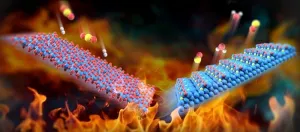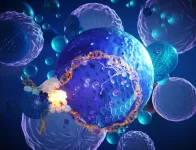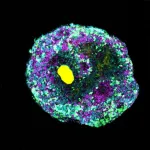(Press-News.org) Researchers at the University of Exeter and clinical radiopharmaceutical company Serac Healthcare Ltd are researching a new molecular imaging marker which could help to detect disease progression sooner.
The novel imaging agent 99mTc-maraciclatide has been used to scan the first patient with the aim of evaluating the marker’s potential for predicting interstitial lung disease in a Phase II study titled ‘PRospective Evaluation of Interstitial Lung Disease progression with quantitative CT’ (“PREDICT-ILD”).
Interstitial lung diseases (ILD) are a heterogenous group of over 200 irreversible conditions with varying degrees of inflammation that, without treatment, lead to scarring (fibrosis) of the lining of the lungs. It affects more than 150,000 people in the UK, with an incidence of 2,000-4,000 and causes significant morbidity and mortality. It is estimated that lung scarring results in 1% of deaths in the UK. The progression of Interstitial lung diseases is unpredictable, making prognostication challenging and creating barriers to effective drug development.
Therapies are available that can slow disease progression in some patients, however current limitations in diagnosis mean that determining the most suitable treatment is challenging, and prescribing the wrong treatment can make the condition worse. For example, certain medications are known to be effective at treating inflammation (which can be a feature of this disease) but can be detrimental in patients with fibrotic disease. Understanding the mechanisms that drive the progression of ILD is an urgent research priority.
The PREDICT-ILD study, led by Professor Chris Scotton, Associate Professor in Respiratory Biomedicine and Dr Giles Dixon, Senior Clinical Research Fellow, both at Exeter, is majorly funded by the Wellcome Trust’s GW4-CAT PhD Programme for Health Professionals.
David Hail, Chief Executive of Serac Healthcare, said: “The distinction between ILD conditions which are characterised by scarring and inflammation is crucial as this determines the appropriate treatment.
“A molecular imaging marker with the potential to differentiate between early-stage inflammation and the fibrosis it causes could have a significant impact on improving patient outcomes, as well as the development of new therapies. We are looking forward to working with the University of Exeter to evaluate maraciclatide’s potential in this new indication.”
Professor Michael Gibbons, Senior Investigator Fellow, NIHR Exeter Biomedical Research Centre, and Consultant Respiratory Physician, Royal Devon University Healthcare NHS Trust, said:
“Being able to detect disease progression sooner and thereby enabling earlier access to disease modifying treatments to appropriate patients would represent a step change in the treatment of this incurable condition. We are excited to be working with Serac Healthcare to evaluate whether maraciclatide could play a part to bring precision medicine to this patient population.”
The 99mTc-maraciclatide study is being facilitated by the Nuclear Medicine Department at the Royal United Hospitals, Bath and is supported by specialist radiologists Dr David Little and Dr Jonathan Rodrigues and specialist ILD physicians Dr Shaney Barratt and Professor Michael Gibbons. The study is also supported by the University of Exeter’s EPSRC Hub for Quantitative Modelling in Healthcare under the guidance of Professor Krasimira Tsaneva-Atanasova. Professor Michael Gibbons is also a Senior Investigator Fellow at the NIHR Exeter Biomedical Research Centre.
99mTc-maraciclatide is for investigational use only and is not approved by the FDA or UK and European regulatory authorities. *
END
New study to explore novel marker in interstitial lung disease prognosis
Researchers at the University of Exeter and clinical radiopharmaceutical company Serac Healthcare Ltd are researching a new molecular imaging marker which could help to detect disease progression sooner.
2024-09-10
ELSE PRESS RELEASES FROM THIS DATE:
Experimenting with different vapes could be crucial to help people quit smoking
2024-09-10
New research from the University of East Anglia (UEA) found that more than a third of quitters who were given a vape in A&E experimented with different devices bought from shops or online
People who smoke and had little experience with vapes were particularly receptive to an opportunistic approach in a medical setting
The study found that some quitters reduced their vaping significantly within a few months, showing that not everyone who uses an e-cigarette becomes dependent on vaping long-term
Peer-reviewed – Observational Study- People
Experimenting with commercially ...
Long-term exercisers have 'healthier' belly fat
2024-09-10
People with obesity who are long-time exercisers have healthier belly fat tissue and can store fat there more effectively than nonexercisers with obesity, according to a new study from a team of researchers at the University of Michigan.
The research team also grew fat tissue in the lab from cells collected from both exercisers and nonexercisers, and cells from the exercisers developed into a tissue that stored fat more effectively.
"Our findings indicate that in addition to being a means to expend calories, exercising regularly for several months to years seems to modify your fat tissue ...
Gene therapy effective in hereditary blindness
2024-09-10
Bothnia dystrophy is a form of hereditary blindness, prevalent in the region Västerbotten in Sweden. A new study at Karolinska Institutet published in Nature Communications shows that gene therapy can improve vision in patients with the disease.
Bothnia dystrophy occurs mainly in the region Västerbotten in Sweden, but the disease has also been identified in other parts of the world. The disease leads to progressive visual impairment due to the destruction of the visual cells in the retina. It is caused by an inherited genetic mutation ...
Report: Conscientiousness, not willpower, is a reliable predictor of success
2024-09-10
CHAMPAIGN, Ill. — According to two psychologists, the field of psychological science has a problem with the concept of self-control. It has named self-control both a “trait” — a key facet of personality involving attributes like conscientiousness, grit and the ability to tolerate delayed gratification — and a “state,” a fleeting condition that can best be described as willpower. These two concepts are at odds with one another and are often confused, the authors report.
“Self-control is a cherished quality. People who have lots of it are celebrated and seen as morally righteous,” wrote University of Toronto psychology professor Michael Inzlicht ...
Advancing prison safety
2024-09-10
The lead article in the current issue of The Criminologist, written by Nancy Rodriguez, University of California Irvine professor of criminology, law and society, shines a light on the lack of prison violence metrics that could help advance safety.
“For the 800,000 persons currently confined and the 200,000 state and federal correctional officers who work within U.S. prisons, the threat of violence is a routine feature of daily life,” she writes. “Accounts from incarcerated persons and staff detail the ever-present threats ...
Towards a better understanding of epigenetics and dynamic gene silencing and reactivation
2024-09-10
Ikoma, Japan – One of the most fascinating discoveries in biology is that cells have mechanisms for dynamically regulating genetic expression. This ability to promote or restrict the transcription of specific genes without altering the DNA sequences themselves is essential to all forms of life, from single-cell organisms to the most complex plants and animal species.
While our understanding of these so-called epigenetic mechanisms is far from complete, remarkable progress has been made in this field with the understanding of the role of the Polycomb Repressive Complex 2 (PRC2). PRC2 is a protein that, in many plants, binds to specific DNA sequences called polycomb ...
Artificial muscles propel a robotic leg to walk and jump
2024-09-09
Inventors and researchers have been developing robots for almost 70 years. To date, all the machines they have built – whether for factories or elsewhere – have had one thing in common: they are powered by motors, a technology that is already 200 years old. Even walking robots feature arms and legs that are powered by motors, not by muscles as in humans and animals. This in part suggests why they lack the mobility and adaptability of living creatures.
A new muscle-powered robotic leg is not only more energy efficient than a conventional one, it can also perform high jumps and fast movements as well as detect and react to obstacles – ...
Researchers develop reaction-induced molybdenum carbides for efficient carbon dioxide conversion
2024-09-09
Molybdenum (Mo) carbides, known for their unique electronic and structural properties, are considered promising alternatives to noble metal catalysts in heterogeneous catalysis. However, traditional methods for preparing Mo carbides suffer from complex processes, stringent synthesis conditions, challenging crystal regulation, and high energy consumption. Additionally, Mo carbides are susceptible to oxidation and deactivation, which poses a significant barrier to their widespread application.
In a study published in Nature Chemistry, a research group led by Prof. SUN Jian from the Dalian Institute ...
Researchers identify factor that drives prostate cancer-causing genes
2024-09-09
For more information, contact:
Nicole Fawcett, nfawcett@umich.edu
EMBARGOED for release at 5 a.m. ET Sept. 9, 2024
Researchers identify factor that drives prostate cancer-causing genes
Factor previously known to play a role in advanced cancer is fundamental in early stages of cancer development
ANN ARBOR, Michigan — Researchers at the University of Michigan Health Rogel Cancer Center have uncovered a key reason why a typically normal protein goes awry and fuels ...
New molecular engineering technique allows for complex organoids
2024-09-09
A new molecular engineering technique can precisely influence the development of organoids. Microbeads made of specifically folded DNA are used to release growth factors or other signal molecules inside the tissue structures. This gives rise to considerably more complex organoids that imitate the respective tissues much better and have a more realistic cell mix than before. An interdisciplinary research team from the Cluster of Excellence “3D Matter Made to Order” with researchers based at the Centre for Organismal Studies and the Center ...
LAST 30 PRESS RELEASES:
Bacteria frozen in ancient underground ice cave found to be resistant against 10 modern antibiotics
Rhododendron-derived drugs now made by bacteria
Admissions for child maltreatment decreased during first phase of COVID-19 pandemic, but ICU admissions increased later
Power in motion: transforming energy harvesting with gyroscopes
Ketamine high NOT related to treatment success for people with alcohol problems, study finds
1 in 6 Medicare beneficiaries depend on telehealth for key medical care
Maps can encourage home radon testing in the right settings
Exploring the link between hearing loss and cognitive decline
Machine learning tool can predict serious transplant complications months earlier
Prevalence of over-the-counter and prescription medication use in the US
US child mental health care need, unmet needs, and difficulty accessing services
Incidental rotator cuff abnormalities on magnetic resonance imaging
Sensing local fibers in pancreatic tumors, cancer cells ‘choose’ to either grow or tolerate treatment
Barriers to mental health care leave many children behind, new data cautions
Cancer and inflammation: immunologic interplay, translational advances, and clinical strategies
Bioactive polyphenolic compounds and in vitro anti-degenerative property-based pharmacological propensities of some promising germplasms of Amaranthus hypochondriacus L.
AI-powered companionship: PolyU interfaculty scholar harnesses music and empathetic speech in robots to combat loneliness
Antarctica sits above Earth’s strongest “gravity hole.” Now we know how it got that way
Haircare products made with botanicals protects strands, adds shine
Enhanced pulmonary nodule detection and classification using artificial intelligence on LIDC-IDRI data
Using NBA, study finds that pay differences among top performers can erode cooperation
Korea University, Stanford University, and IESGA launch Water Sustainability Index to combat ESG greenwashing
Molecular glue discovery: large scale instead of lucky strike
Insulin resistance predictor highlights cancer connection
Explaining next-generation solar cells
Slippery ions create a smoother path to blue energy
Magnetic resonance imaging opens the door to better treatments for underdiagnosed atypical Parkinsonisms
National poll finds gaps in community preparedness for teen cardiac emergencies
One strategy to block both drug-resistant bacteria and influenza: new broad-spectrum infection prevention approach validated
Survey: 3 in 4 skip physical therapy homework, stunting progress
[Press-News.org] New study to explore novel marker in interstitial lung disease prognosisResearchers at the University of Exeter and clinical radiopharmaceutical company Serac Healthcare Ltd are researching a new molecular imaging marker which could help to detect disease progression sooner.







